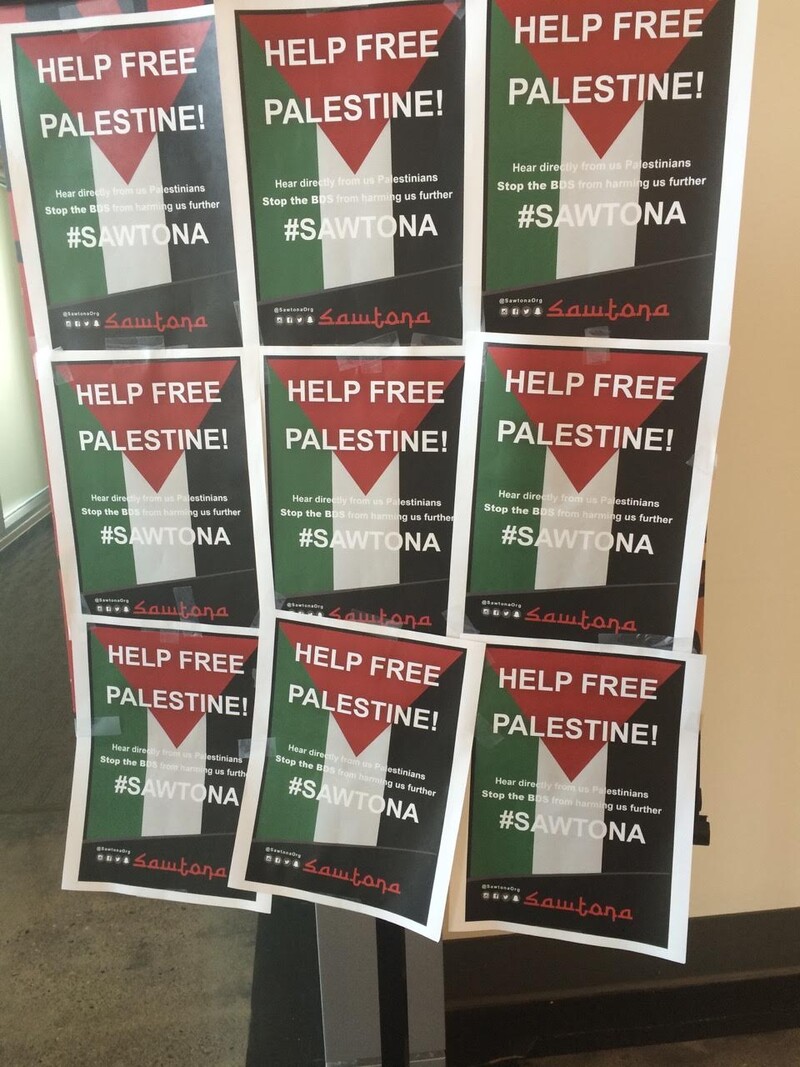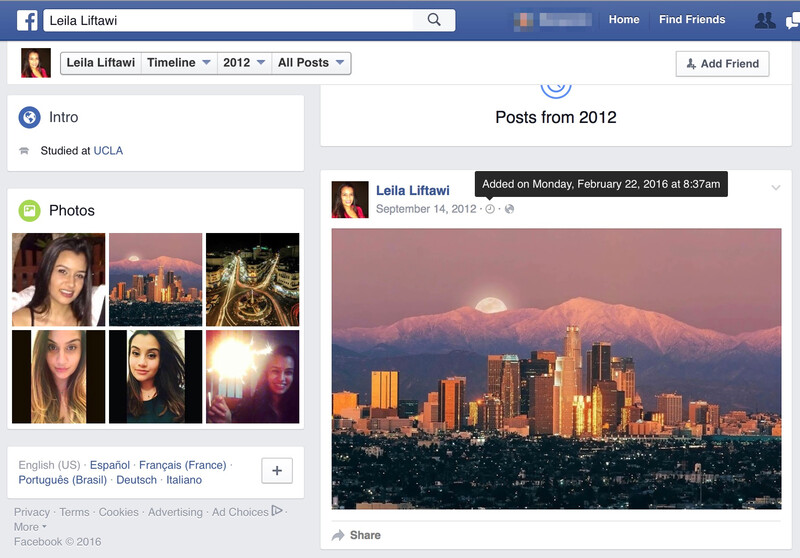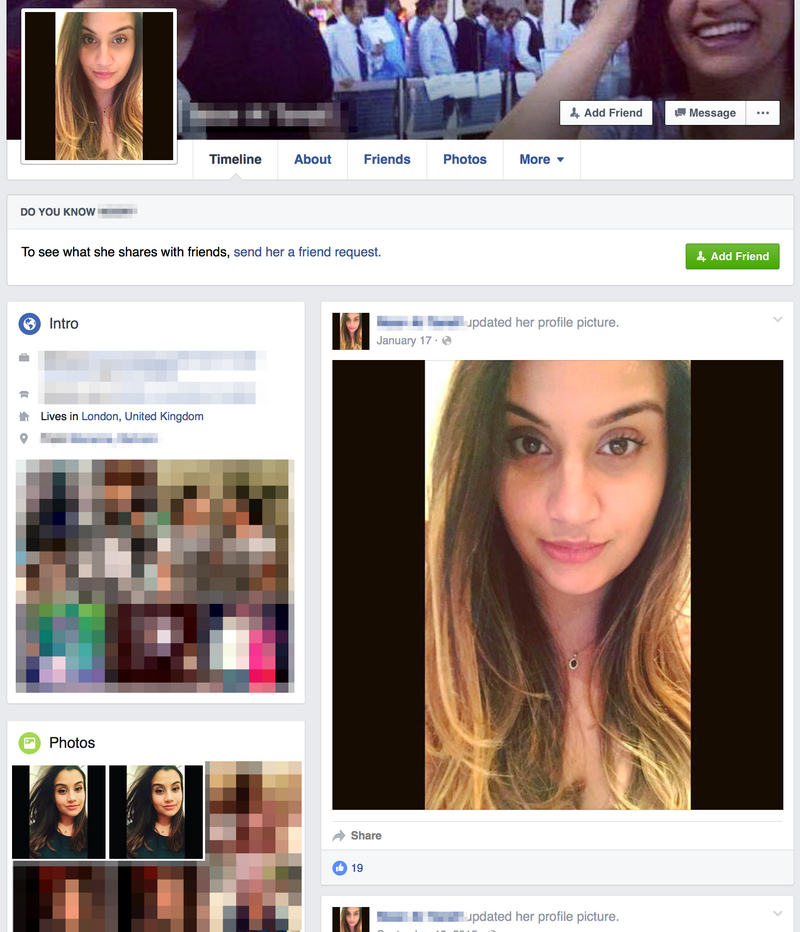The Electronic Intifada 15 April 2016

Sawtona flyers appeared on an Indiana campus even though the group claims to have no contacts in the state.
Claiming to be a group of Palestinians opposed to the growing boycott, divestment and sanctions (BDS) movement in the US, an organization calling itself Sawtona – “our voice” in Arabic – has emerged over the last two months.
But the organization does not appear to be what it says it is.
The group first emerged at Indiana University–Purdue University Indianapolis (IUPUI) last month when faculty and students were meeting to discuss BDS and support for Palestinians.
It then popped up at City University of New York (CUNY), just ahead of today’s scheduled graduate student council vote on a resolution to boycott Israeli academic institutions.
The group claims to be a voice “from the ground” in Palestine that is dedicated to ending Israel’s occupation. But so far the only objective Sawtona has in fact pursued is to stop BDS, claiming it does more harm than good for Palestinians.
And some evidence – including fraudulent postings on Facebook – cast significant doubt on the group’s central claim that it is run by Palestinians.
Rather, the group would appear to be based in present-day Israel – not Palestinian cities in the occupied West Bank where people representing Sawtona claim to live.
Sawtona has emerged at a moment when Israel has greatly stepped up its efforts to sabotage and attack the BDS movement, including efforts to undermine it by Israeli intelligence agencies.
Indiana inconsistency
Edward Curtis IV, a professor of religious studies at IUPUI, told The Electronic Intifada that moments before he was scheduled to deliver a lecture titled “Why we support the boycott of Israel,” he received a phone call from a man calling himself Anwar Salem, from Sawtona. The man told Curtis he was calling from Ramallah in the West Bank.
Curtis said that Salem requested that he not deliver his speech and told him that the growing BDS movement was “hurting Palestinians.” Salem repeated common anti-BDS talking points, including the claim that BDS takes jobs away from Palestinians.
Curtis had already seen flyers around campus stating “stop the BDS from harming us further, #SAWTONA” against the background of a Palestinian flag.
Curtis, who founded IUPUI Faculty and Staff for Justice in Palestine, an approximately 30-strong group who have signed onto BDS, told Salem that he would carry on with his plans to deliver his speech later that day, 8 March, at an event organized by the Interfaith Coalition for Palestine, founded by alum Sireen Zayed.
In a follow-up email, Curtis asked Salem who he is working with at IUPUI who distributed the flyers and posted photos of the event to Sawtona’s Twitter feed – photos which have since been removed.
Salem did not answer, saying “I don’t know Palestinians in Indiana, I just heard of the conference from people in Indiana who are also opposing BDS and I felt like I had to do something.”
It remains a mystery who could have put up the Sawtona flyers at IUPUI or tweeted from the event on Sawtona’s account when Anwar Salem claims his group has no members in Indiana.
Zayed told The Electronic Intifada that a day after that event her mother received several phone calls at her workplace from an unknown number, which she did not pick up.
When Zayed’s mother did finally answer, the man on the other end identified himself as Anwar Salem from Sawtona, but this time said he was from Nablus, in the West Bank.
He spoke in fluent Arabic and asked to speak to her daughter, Sireen. When Zayed’s mother said her daughter was unavailable, he asked to speak to Sireen’s father, saying “I need to speak to someone about Sireen’s tweets and why it’s wrong to boycott Israel. What she says is a shame.”
He proceeded to tell Zayed’s mother why BDS hurts Palestinians.
When her mother told her what happened, Zayed became suspicious about the caller’s identity and suspected Salem had found her mother’s work number on her workplace website.
She checked the site’s traffic log – which has been seen by The Electronic Intifada – and saw that the only recent visitor had viewed the website three minutes before Salem’s first attempt to call her mother.
That visitor’s IP address could be traced back to the city of Bat Yam in present-day Israel – not to Nablus or Ramallah, as Salem had variously claimed his location to be.
The visitor’s Internet service provider was the Israeli company Bezeq International.
Given that Zayed’s site does not receive much traffic, the visit was conspicuous and unlikely to have been mere coincidence.
The Electronic Intifada contacted Sawtona using the email address on its website, and Anwar Salem responded. In subsequent correspondence he failed to explain when asked why his IP address appeared to be located in present-day Israel.
Instead, writing generally, he responded: “Our movement is composed mostly of Palestinians, living in Palestine. Due to the political sensitivity in our area, most of our members are fearful of exposing themselves but there are many families who joined us.”
He wrote that Sawtona is the voice of those Palestinians who have been fired: “We are the voice of the people that have been touched by this collective punishment.”
“Our aim is that the world will force the occupiers to employ hundred of thousands of Palestinians and that they would take the responsibility of the economic system, and so they will understand that the occupation is not worthwhile economically speaking,” he added.
While all of Salem’s emails are written in fluent English, in one email to IUPUI’s Curtis, Salem claims, “It is very hard for me to speak a lot of English, if you want we can speak Arabic.”
Facebook fraud
In New York, meanwhile, a person using the name Leila Liftawi, who claimed to be a volunteer with Sawtona living in “Palestine,” has been aggressively contacting representatives on CUNY’s Doctoral Student Council (DSC) this week, primarily through email and Twitter, urging them to vote against the BDS resolution.
In one such email to Velina Manolova, a doctoral student in the English department and a DSC representative-at-large, Liftawi claimed “Palestinians are beginning to link the increased suffering of our people to the spread of the BDS movement.”
She did not offer any personal analysis or evidence to back up the assertion.
Liftawi sent the same letter to other DSC representatives as well.
Manolova says that after she received the email, both Liftawi and Anwar Salem sent her “friend” requests on Facebook.

Facebook page for “Leila Liftawi,” created in February, uses a backdated profile picture in an apparent effort to make it appear much older than it is.
Liftawi’s and Salem’s Facebook accounts show evidence of efforts to create a history predating the sudden appearance of Sawtona in February.
Both the Salem and Liftawi Facebook accounts were created within days of each other in February. The Sawtona group’s Facebook account made its first post on 16 February.
And both the Salem and Liftawi accounts appear to have been manipulated to look older than they are. For example, Leila Liftawi posted a photo on 22 February 2016, but backdated it as 14 September 2012. Anwar Salem’s profile picture was uploaded on 15 February 2016 but backdated to 13 February 2014.
Both accounts are virtually empty of posts and connections to other verifiable persons.
Sireen Zayed says the Anwar Salem persona had only one friend on Facebook when she became aware of it.
Profile images purporting to be of “Leila Liftawi” are actually stolen from another Facebook user, who posted them on her page in January. This screenshot shows the original source of the photos, with identifying information of the user removed to protect her privacy.

The images of “Leila Liftawi” were stolen from another Facebook user who posted them on her personal account in February. Identifying information has been removed.
Furthermore, while Anwar Salem told Curtis he lives in Ramallah, his Facebook profile says he lives in Nablus, in the northern West Bank.
The next day, Manolova received another email from Liftawi that was also sent to other undisclosed recipients. This one responded to the “accusations” against the group, including why they remain anonymous.
“WE [sic] are the voice of the voiceless,” Liftawi wrote, adding that it is necessary for people in the group to remain anonymous “out of fear of being branded ‘traitors’ by other activists.”
This is a convenient excuse for anonymity and seemingly relies on stereotypes promoted by Israel and its surrogates that Palestinians, especially supporters of BDS, are intolerant and potentially violent.
The Palestinian BDS National Committee (BNC), the broad civil society coalition that leads the movement, has occasionally criticized high-profile Palestinian public figures and businessmen who it sees as violating the call to boycott Israel, but always in civil terms, and there have been no incidents that would justify any safety fears arising from such rare admonitions.
Just another anti-BDS effort
Sawtona’s efforts are only the most recent attempt to derail the burgeoning BDS movement at CUNY, the largest urban university system in the US.
Since February, CUNY’s Students for Justice in Palestine group has been under scrutiny following a 14-page letter from the Zionist Organization of America alleging widespread anti-Semitism by SJP members.
ZOA demanded the university publicly condemn the group and investigate its funding.
While the letter’s allegations against SJP have little substantiation – an investigation conducted by The Jewish Daily Forward found that it was not clear that SJP was responsible for any of the allegations made in the ZOA letter or indeed if all of the instances of anti-Semitism cited ever even occurred – the university system immediately launched an investigation.
Jeremy Randall, one of the DSC representatives who proposed the resolution, told The Electronic Intifada that the Graduate Center at CUNY was not named in the ZOA letter and “as of now, the allegations of anti-Semitism made by ZOA have not impacted or affected any academic boycott activism on campus.”
The resolution has been endorsed by the Critical Palestinian Studies Association, the Middle Eastern Studies Organization, the Postcolonial Studies Group at the Graduate Center and the CUNY Adjunct Project.
According to Hamad Sindhi, co-chair for communications at the DSC, a majority of the 77 representatives serving on the council must vote in favor of the resolution, which seeks to endorse the academic boycott of Israeli institutions, in order for it to pass.
Manolova says she cannot speak on behalf of Palestinians on the ground, but emphasized that the “BDS National Committee is the largest Palestinian grassroots coalition, representing over 170 diverse human rights groups and labor unions, including farmworker and teachers’ associations.”
The messages signed by Leila Liftawi have argued that the academic boycott has failed to make life better for Palestinian students, seemingly blaming the boycott for failing to prevent recent Israeli attacks on Birzeit University, Al-Quds University and the Palestine Technical University.
But Manolova says such assaults are precisely why academics around the world must stand up for Palestinians’ right to education.
“The academic boycott, in particular, addresses Israeli academic institutions’ complicity in the brutality of the occupation.”
Charlotte Silver is a journalist based in Oakland, California.





